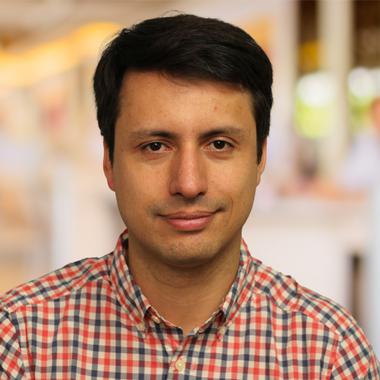After graduating from the Pontificia Universidad Cátholica de Chile with a Bachelor of Science in Civil Engineering in Computer Science and a Master of Science in Computer Science, Sebastián Echeverria worked in industry for six years in various roles. During that time he grew frustrated with his depth of knowledge. “I felt that I was struggling with how to do architecture properly, how to do planning and tracking for the specific circumstances that I faced. I felt like I was missing something, and that I was often trying to figure out on the fly how to do things that were new to me. I knew that there must be a way to do it better.“
Fantastic voyage
His quest for a better way to approach software architecture brought him to CMU where he acquired the skills he felt he had been lacking, and found learning opportunities in unexpected places. “Some of my fondest memories from the MSE are of working on the studio project with my teammates — and we’re still friends all these years later. Not only the fact that we worked well as a team, but also that we were all from different countries and different cultures. It was also amazing to get to know them so well and to see how things work differently in different locations around the world. I learned so much more than I had expected. I really treasure that experience.”
After earning his MSE he worked as an Advanced Mobile Systems Engineer at the Software Engineering Institute (SEI) for a year before returning to Chile. While in Chile, he maintained a connection with CMU, working as an independent contractor for the SEI and as an instructor for the MSE distance education program teaching the Managing Software Development course.
In 2017 Sebastián and his family returned to Pittsburgh and he resumed full-time employment at SEI as a Software Engineer engaged in researching IoT security, machine learning techniques, and architectural approaches to improve ML-based systems.
From earth to heaven
In 2018, when a colleague at the SEI no longer had the time necessary to be a project mentor, Sebastián was asked to take his place. He welcomed the opportunity to become further engaged in the MSE community. “I had very good mentors when I was a student. I learned so much from the advice they gave and the various teaching methods they used. I felt that I wanted to give that back, to share that with other people. Mentoring a studio project is a great opportunity for me to try those teaching techniques I observed and share my knowledge.”
Sebastián, alongside Clif Huff, mentored the 2019 RadPiper team tasked to design and develop vital backend infrastructure for a robotic platform that can safely and efficiently deconstruct decommissioned nuclear facilities. The next year they joined forces again to mentor the 2020 Moonshot team, the first MSE project team to work on the design and implementation of the ground console processes for the MoonRanger robot which is scheduled to launch in 2023.
Having been through the process as a student has given him a unique perspective and allows him to approach the role from a different angle. He knows where the pitfalls are, the “types of challenges the students would be facing in terms of the scope of the project. I know the types of things they [tend to] struggle with and I know what specific things they will need help with. The experience of being a student and having done the project, helped in my preparations on how to guide them and move them forward.”
